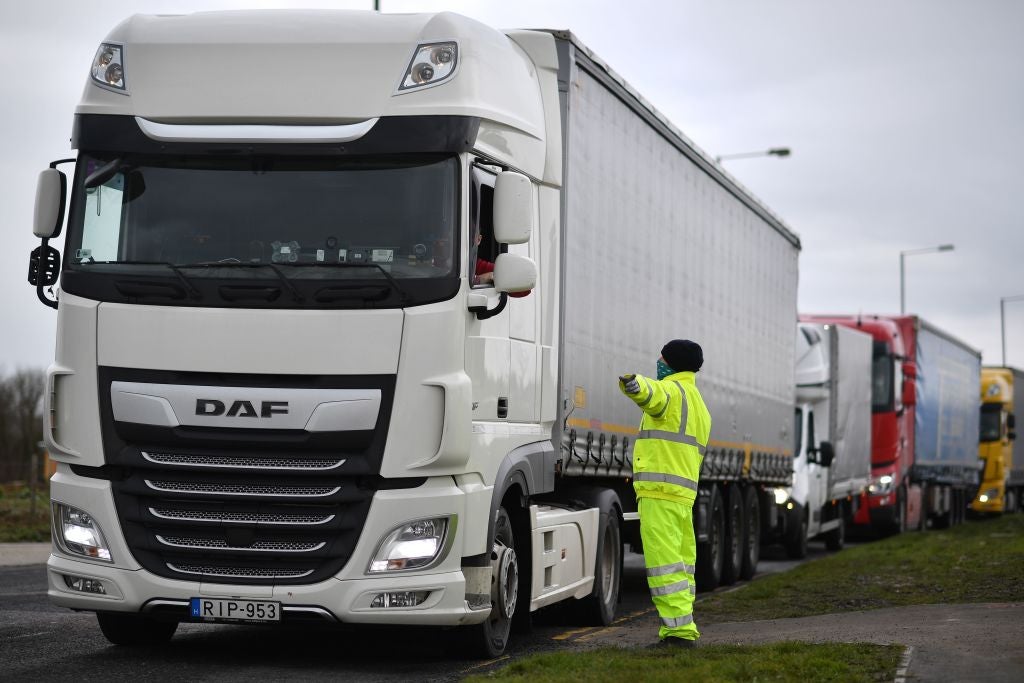Lorry drivers hit out at GPs over long waits and ‘extortionate’ fees for medical checks
Drivers call on doctors to end rip-off fees for ‘fit-to-work’ checks and hit back at claim they might be lying about health conditions

GPs have been accused of potentially contributing to a nationwide shortage of lorry drivers that has caused shelves in some supermarket aisles to lay empty.
Drivers say GPs have quoted them “extortionate” fees of up to £160, as well as wait times of six weeks, to obtain vital medical checks. Some drivers say that their GP has even refused to make an appointment to carry out the checks.
All lorry drivers require a “fit to drive” assessment before they can apply for an HGV licence. Drivers aged over 45 must go through the process every five years and those 65-plus need to do them annually.
The checks were deprioritised during the pandemic leading to a backlog of applications that has increasingly been filled by private providers, many of whom charge a fraction of the amount that GPs do.
This week, the British Medical Association, a representative body for doctors, wrote to the government urging ministers to make it mandatory for drivers to obtain fit to work checks through their own GP.
The BMA claimed that only a GP with full access to a driver’s medical records could properly carry out the assessment. It warned that drivers could be withholding important information about conditions like epilepsy or diabetes in order to obtain a licence.
Dr Peter Holden, chair of the BMA’s professional fees committee, said drivers were “bypassing the queue” at their local GP by going to a private provider.
While he conceded that private firms might help to alleviate a backlog of HGV licence applications he said it created a risk that “medical conditions may be, either intentionally or unintendedly, understated and this has already had a grave impact on road safety”.
The claim angered lorry drivers who hit back at the allegation they are risking road safety, arguing that they have been forced to look elsewhere because GP’s have been overcharging for what is a relatively quick and simple medical check. One driver accused GPs of “profiteering”.
Harrie Vogels, who has been a lorry driver for 40 years, said the prices GPs charge are “ridiculous”. Private companies are able to do the medicals for around £50 – around £100 less than GPs often charge – he said. Dozens of companies advertise for the checks on Google, quoting similar fees.
Mr Vogels, who is 67, has to have a new check each year as well as an eye test costing £40. “It is a lot of money. I have been to some of these private companies myself and they are real doctors. Most of them work on weekends which is when drivers have time.”
“I think [the BMA] want to get rid of them so that GPs can get more money,” said Mr Vogels.
The BMA did not respond to the allegation.
Another driver, who did not wish to be named, said that GPs were causing a bottleneck in licence applications that would worsen if they had a “monopoly” on fit-to-work checks.
Gerald Davison, who is seeking to apply for a licence, said he was quoted £135 by his GP.
“The price in comparison to private services is extortionate. If you can get a service, in good faith where you will be honest, with a registered doctor, why would you pay over twice the price and wait a very long time?”
“I suspect that my GP practice is busy enough as it is and sets their pricing to dissuade patients from using them for this purpose,” he said.
“The exam is a relatively quick process. I cannot see a justification for charges in excess of £100.”
The BMA did not comment on why GPs’ fees were higher.
Haulage industry bosses have said a backlog in licence applications at the Driver and Vehicle Licence Authority is partly to blame for increasing problems with supplies of food and a host of other products.
Thousands of applications were held up due to the pandemic, worsening a shortage of lorry drivers. The DVLA blamed social distancing rules in force at its Swansea headquarters as well as strikes. Last week it started processing applications from motorists who submitted licence forms in early June.
Join our commenting forum
Join thought-provoking conversations, follow other Independent readers and see their replies
Comments
Bookmark popover
Removed from bookmarks